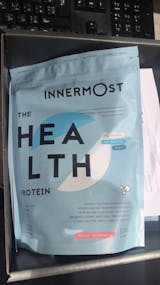Looking to increase your strength, tone up or maintain your weight? The Strong Protein can help with that.
Aside from this award-winning supplementation, though, you may have heard that resistance training is a great way to do that. But what is resistance training, what are the benefits of resistance training and can resistance training burn fat? All very good questions.
What is resistance training
Put simply, resistance training is an overarching term that refers to any exercises that cause muscles to contract against an external resisting force (typically a weight or resistance band). The aim of the game when it comes to resistance training is to up your strength, increase your power and tone up.
Pretty much any exercise can be tailored into a resistance training exercise, due to the flexibility and adaptability of the strategy. And that’s why it’s one of our favourites.
Whatever your fitness goal, there’s a perfect resistance training exercise to help you get there, and that’s why the workout style is so popular. It’s a real classic, and something you should definitely be incorporating into your schedule.
Can resistance training burn fat?
Yes, absolutely! The implementation of resistance training in your workout routine has been proven to reduce fat and therefore aid in weight loss when regularly engaged in. A study published by The International Journal of Cardiology in 2013 revealed that when compared to just cardio training such as running, swimming and cycling, high-intensity resistance training led to faster weight-loss. Music to our ears.
The benefits of resistance training
The best part about resistance training is the range of benefits that resistance exercises bring to the table. From better posture to increased balance, the benefits of resistance training are (seriously) impressive and include:
- Increased flexibility levels
- Weight management assistance
- Enhanced performance
- Pain management benefits
- Decreases blood pressure
- Lowers your risk of dementia
- Improves overall self-esteem
- Decreases stress and anxiety
Best exercises for resistance training
As with all workout strategies and routines, it’s important to mix it up. Ensure that you are targeting a range of muscle groups and making time for rest days in between workouts… it’s really important that you are giving your muscles at least 48 hours of recovery time to prevent injury. Rest days are just as important as workout days, we promise!
When it comes to the best resistance training exercises, this entirely depends on your end fitness goal, current fitness level, and most importantly, what you enjoy doing. Whether you use free weights, resistance bands or body weight, some of our favourite resistance training exercises include:
- Seated rows
Up the weight here and for an extra burn, add a resistance band around your thighs. You’ll hate us for it but thank us later.
- Banded squats
Banded squats are an effective way to make the most of your workout and really target those gluteal muscles. Next time leg and bum day rolls around, place a resistance band just above your knees and lower into the squat formation and repeat. Go for a set of pulse squats too, if you’re feeling particularly brave. Prepare to feel the burn.
- Hip abductions
Next time you’re at the gym, head on over to the hip abduction machine. This is one of our favourite resistance training exercises and really targets your gluteal muscles.
- Bench presses
An absolute classic: bench presses are a must on arm day. Adding bench presses to your resistance training routines is a sure-fire way to improve your upper body strength and tone your muscles.
- Lunges
A top tip is to add resistance bands to your current favourite exercises such as lunges for an extra burn. Depending on your strength level and desired result, resistance bands come in varying ‘resistance’ stages such as light, moderate, and heavy, so you can really feel the burn.
Why do resistance training
You may be thinking, well, that’s all well and good… but I’m not looking to add weights to my routine. I’m happy with my cardio. And whilst that’s all well and good, it’s great to mix up your workouts for a few reasons. And resistance exercises can help with that.
It’s important to diversify your workouts to not only give your body a chance to rest and recover, but to ensure that you are always challenging yourself (both physically and mentally), avoid getting bored, and ensure that you are avoiding risk of injury.
The flexibility of resistance training not only allows you to switch it up, but you’re also able target different muscle groups and reap some of the amazing benefits we mentioned above whilst increasing your fitness levels, too. That sounds like a win-win.
Summary
So, if you’re not already including resistance training exercises into your workout regime, we hope we've convinced you to give it a go. We think that the impressive list of benefits of the technique alone is reason enough to start your resistance training journey, but if you’re working towards fitness goals such as increased muscle mass and greater weight loss, this strategy is definitely one for you.
References
- Dutheil, F., Lac, G., Lesourd, B., Chapier, R., Walther, G., Vinet, A., Sapin, V., Verney, J., Ouchchane, L., Duclos, M., Obert, P., & Courteix, D. (2013). Different modalities of exercise to reduce visceral fat mass and cardiovascular risk in metabolic syndrome: the RESOLVE randomized trial. International journal of cardiology, 168(4), 3634–3642. Click here.
























